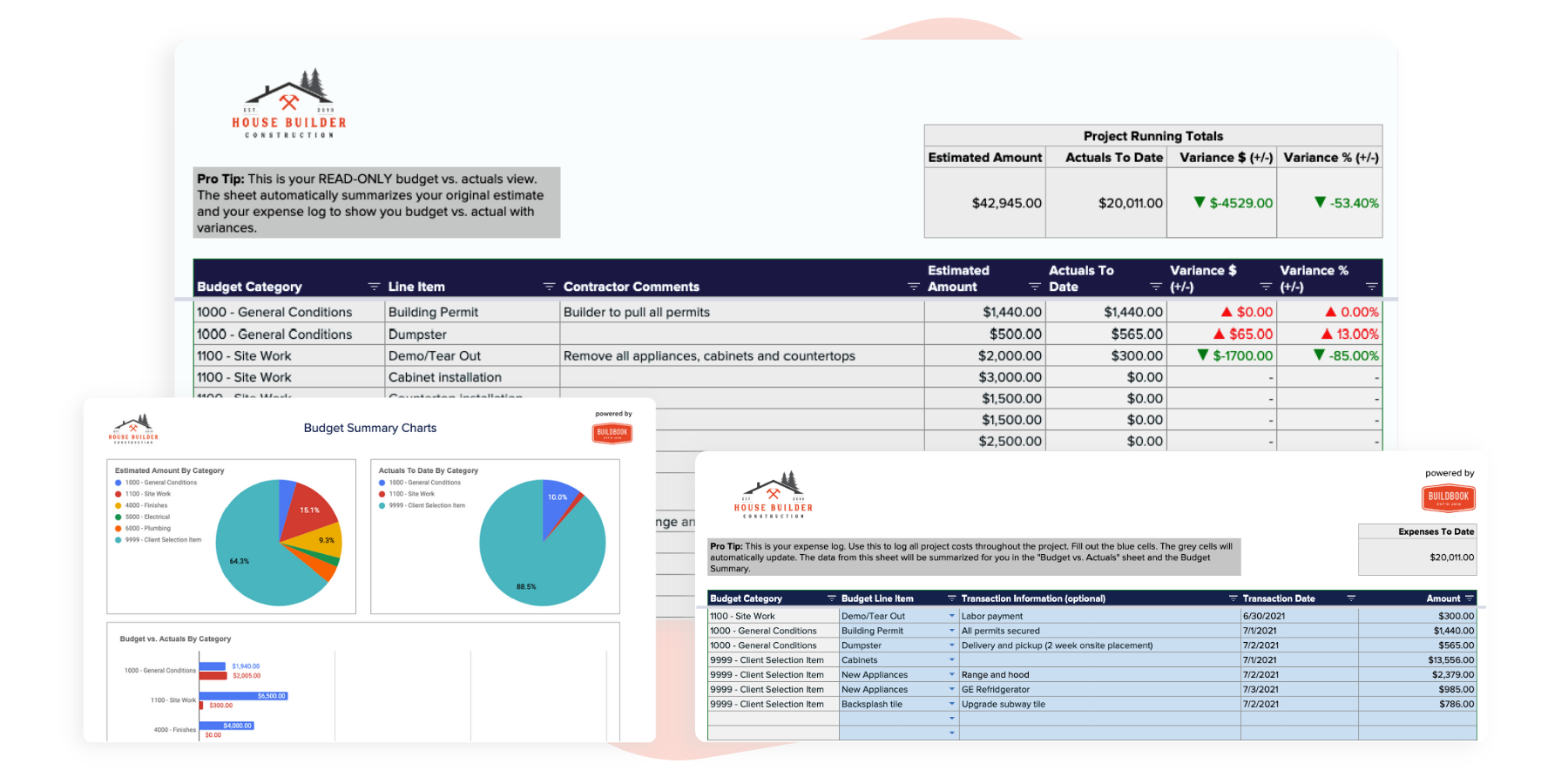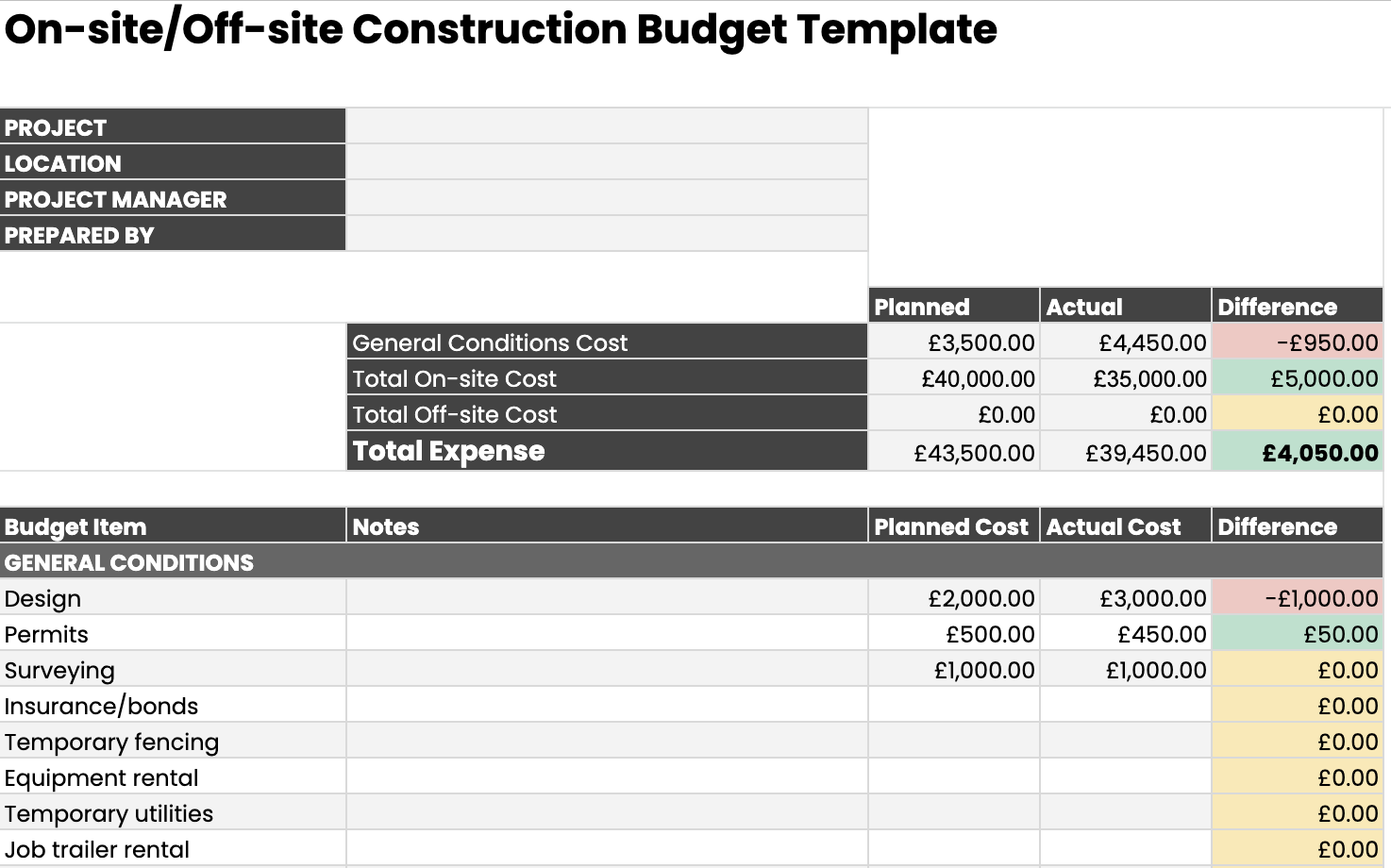Are you planning to build your dream home or renovate your current space? One of the most crucial aspects of any residential construction project is the budget. Without a well-defined budget, you may end up overspending or running out of funds before the project is completed. To help you stay on track financially, consider using a residential construction budget template. This tool can provide you with a clear overview of all the costs involved in your project, helping you make informed decisions and avoid any financial surprises along the way.
What is a Residential Construction Budget Template?
A residential construction budget template is a pre-designed spreadsheet or document that outlines all the expenses associated with building or renovating a home. It typically includes categories such as materials, labor, permits, design fees, and contingency funds. By using a budget template, you can easily track your expenses, compare actual costs to estimated costs, and make adjustments as needed to stay within your budget. This tool can also help you prioritize spending and allocate funds to different aspects of the project based on your needs and preferences.
The Purpose of Using a Residential Construction Budget Template

Image Source: fohlio.com
The main purpose of using a residential construction budget template is to help you plan and manage your project’s finances effectively. By creating a detailed budget upfront, you can avoid overspending, identify areas where you can save money, and ensure that you have enough funds to complete the project. A budget template can also serve as a roadmap for your project, guiding you through each stage of construction and keeping you on track towards your financial goals. Additionally, having a clear budget in place can make it easier to communicate with contractors, suppliers, and other stakeholders, ensuring that everyone is on the same page regarding costs and expectations.
Why You Should Use a Residential Construction Budget Template
There are several reasons why using a residential construction budget template is essential for the success of your project. First and foremost, a budget template can help you avoid costly mistakes and delays by providing a comprehensive overview of all the expenses involved in the construction process. It can also give you a sense of control and peace of mind, knowing that you have a clear plan in place to manage your finances effectively. Furthermore, a budget template can help you make informed decisions about where to allocate your funds, prioritize spending, and adjust your budget as needed to accommodate any changes or unexpected costs that may arise during the project.
How to Create and Use a Residential Construction Budget Template

Image Source: smartsheet.com
Creating a residential construction budget template is a relatively straightforward process. Start by listing all the expenses you anticipate for your project, including materials, labor, permits, design fees, and any other costs associated with the construction or renovation. Next, assign a budgeted amount to each category based on your estimates and research. As you progress through the project, track your actual expenses and compare them to your budgeted amounts to ensure that you are staying within your financial limits. Make adjustments as needed to keep your project on track and avoid any budget overruns.
1. Start by gathering quotes and estimates from contractors, suppliers, and other professionals to get a realistic idea of your project’s costs.
Before creating your budget template, it’s essential to have a clear understanding of how much each aspect of your project will cost. Reach out to multiple contractors, suppliers, and designers to get quotes and estimates for materials, labor, and other expenses. This will help you create a more accurate budget and avoid any surprises down the line.
2. Break down your budget into specific categories to track expenses more effectively.

Image Source: slideteam.net
Dividing your budget into categories such as materials, labor, permits, design fees, and contingency funds can help you track your expenses more effectively and identify areas where you may be overspending. This level of detail can also make it easier to make adjustments to your budget as needed and ensure that you have enough funds allocated to each aspect of the project.
3. Regularly update and review your budget to stay on track and make informed decisions.
Once you have created your budget template, it’s crucial to update it regularly and review your expenses to ensure that you are staying on track. Make adjustments as needed based on your actual costs and keep a close eye on any variances between your budgeted amounts and your actual expenses. This will help you avoid budget overruns and make informed decisions about your project’s finances.
4. Consider using budgeting software or tools to streamline the process and track your expenses more efficiently.

Image Source: archdesk.com
If you find it challenging to create and manage a budget template manually, consider using budgeting software or tools to streamline the process. Many online platforms and apps are available that can help you track your expenses, create budgets, and monitor your project’s financial progress in real-time. These tools can save you time and effort while providing you with valuable insights into your project’s finances.
5. Be prepared to make adjustments to your budget as needed to accommodate any changes or unexpected costs.
During the construction process, unexpected costs or changes may arise that can impact your budget. Be prepared to make adjustments as needed to accommodate these changes and ensure that you have enough funds to complete the project. Having a flexible budget and a contingency fund in place can help you navigate any unforeseen expenses and keep your project on track financially.
6. Communicate openly and transparently with your contractors, suppliers, and other stakeholders about your budget and financial goals.

Image Source: levelset.com
Effective communication is key to successfully managing your project’s budget. Be open and transparent with your contractors, suppliers, and other stakeholders about your budget constraints, financial goals, and expectations. This will help you avoid any misunderstandings or disagreements regarding costs and ensure that everyone is aligned on the project’s financial objectives.
7. Monitor your project’s progress and financial performance regularly to identify any potential budget issues early on.
Regularly monitoring your project’s progress and financial performance can help you identify any potential budget issues early on and take corrective action before they escalate. Keep track of your expenses, compare them to your budgeted amounts, and look for any variances or trends that may require attention. By staying proactive and vigilant, you can avoid costly mistakes and keep your project on track financially.
8. Seek professional advice or guidance if you are unsure about creating or managing your budget effectively.

Image Source: website-files.com
If you are unsure about creating or managing your budget effectively, don’t hesitate to seek professional advice or guidance. Consulting with a financial advisor, accountant, or construction expert can provide you with valuable insights and recommendations to help you navigate your project’s finances successfully. They can offer advice on budgeting best practices, cost-saving strategies, and ways to optimize your financial performance throughout the construction process.
Tips for Successful Residential Construction Budgeting
Creating and managing a residential construction budget can be a challenging task, but with the right approach and tools, you can set yourself up for success. Here are some tips to help you budget effectively and avoid any financial pitfalls along the way:

Image Source: archdesk.com
Set realistic financial goals and expectations for your project. Before starting your construction project, determine how much you can afford to spend and set realistic financial goals to guide your budgeting process.
Research costs and gather estimates from multiple sources. Don’t rely on a single quote. Instead, gather estimates from several contractors, suppliers, and professionals to get an accurate idea of your project’s costs.
Allocate funds wisely and prioritize spending. Determine which aspects of your project are most important to you and allocate your funds accordingly. Prioritize spending on essential items and allocate funds to discretionary expenses based on your preferences.
Track your expenses and update your budget regularly. Keep a close eye on your expenses and update your budget regularly to ensure that you are staying on track financially. Make adjustments as needed to accommodate any changes or unexpected costs that may arise.
Communicate openly and transparently with your team. Effective communication with contractors, suppliers, and other stakeholders is essential to successful budgeting. Be open and transparent about your budget constraints, financial goals, and expectations to avoid any misunderstandings or disagreements.
Stay proactive and flexible in your approach to budgeting. Be prepared to make adjustments to your budget as needed and stay proactive in monitoring your project’s financial performance. Stay flexible and open to changes to ensure that you can navigate any unexpected expenses or challenges that may arise.
In Conclusion

Image Source: smartsheet.com
A residential construction budget template can be a valuable tool in helping you plan, manage, and track your project’s finances effectively. By creating a detailed budget upfront, staying on top of your expenses, and making informed decisions about your spending, you can avoid costly mistakes and keep your project on track financially. Remember to prioritize communication, stay proactive, and seek professional advice if needed to ensure that your construction project is a success. With the right approach and tools in place, you can bring your dream home to life while staying within your budget.

Image Source: smartsheet.com

Image Source: smartsheet.com